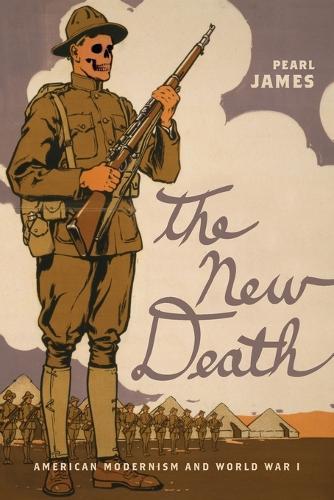Overview
Adopting the term """"new death,"""" which was used to describe the unprecedented and horrific scale of death caused by the First World War, Pearl James uncovers several touchstones of American modernism that refer to and narrate traumatic death. The sense of paradox was pervasive: death was both sanctified and denied; notions of heroism were both essential and far-fetched; and civilians had opportunities to hear about the ugliness of death at the front but often preferred not to. By historicising and analysing the work of such writers as Willa Cather, Ernest Hemingway, F. Scott Fitzgerald, and William Faulkner, the author shows how their novels reveal, conceal, refigure, and aestheticise the violent death of young men in the aftermath of the war. These writers, James argues, have much to say about how the First World War changed death's cultural meaning.
Full Product Details
Author: Pearl James
Publisher: University of Virginia Press
Imprint: University of Virginia Press
Dimensions:
Width: 14.90cm
, Height: 2.00cm
, Length: 22.60cm
Weight: 0.369kg
ISBN: 9780813934082
ISBN 10: 0813934087
Pages: 272
Publication Date: 30 April 2013
Audience:
General/trade
,
General
Format: Paperback
Publisher's Status: Active
Availability: Manufactured on demand

We will order this item for you from a manufactured on demand supplier.
Reviews
James's clearly written and innovative close readings provide considerable food for thought. This is a readable, interesting and sometimes provocative. --Literature & History In discussions of canonical works about which much has already been written, The New Death is at the same time grounded in each work but also innovative. --American Literature Written in a refreshingly approachable language and illustrated with numerous examples from these works, James's study offers a new view of how World War One changed the cultural meaning of death and how this meaning continues to be dealt with in popular novels today. --Roads to the Great War James's fascinating book deepens our understanding of American Modernism and the profound cultural effects of the Great War. --Daniel Murphy, Hanover College James's study paves the way for further examination of New Death in American literature . --Aristi Trendel, Universite du Maine, France These are rich and often brilliant close readings, and they support the author's argument that the trauma of the Great War--'new death'--lurks in more literary corners than we have previously recognized. --Steven Trout, University of South Alabama
In discussions of canonical works about which much has already been written, The New Death is at the same time grounded in each work but also innovative. --American Literature Written in a refreshingly approachable language and illustrated with numerous examples from these works, James's study offers a new view of how World War One changed the cultural meaning of death and how this meaning continues to be dealt with in popular novels today. --Roads to the Great War James's clearly written and innovative close readings provide considerable food for thought. This is a readable, interesting and sometimes provocative. --Literature & History James's study paves the way for further examination of New Death in American literature . --Aristi Trendel, Universite du Maine, France James's fascinating book deepens our understanding of American Modernism and the profound cultural effects of the Great War. --Daniel Murphy, Hanover College These are rich and often brilliant close readings, and they support the author's argument that the trauma of the Great War--'new death'--lurks in more literary corners than we have previously recognized. --Steven Trout, University of South Alabama
These are rich and often brilliant close readings, and they support the author's argument that the trauma of the Great War--'new death'--lurks in more literary corners than we have previously recognized.--Steven Trout, University of South Alabama
These are rich and often brilliant close readings, and they support the author's argument that the trauma of the Great War--'new death'--lurks in more literary corners than we have previously recognized.--Steven Trout, University of South Alabama These are rich and often brilliant close readings, and they support the author's argument that the trauma of the Great War 'new death' lurks in more literary corners than we have previously recognized.--Steven Trout, University of South Alabama
<p>These are rich and often brilliant close readings, and they support the author's argument that the trauma of the Great War--'new death'--lurks in more literary corners than we have previously recognized.--Steven Trout, University of South Alabama
These are rich and often brilliant close readings, and they support the author's argument that the trauma of the Great War 'new death' lurks in more literary corners than we have previously recognized.</p>--Steven Trout, University of South Alabama
<p>These are rich and often brilliant close readings, and they support the author's argument that the trauma of the Great War-- new death --lurks in more literary corners than we have previously recognized.--Steven Trout, University of South Alabama
Author Information
Pearl James, Assistant Professor of English at the University of Kentucky, USA is editor of Picture This: World War I Posters and Visual Culture.




